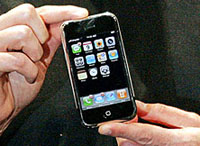Apple introduces iPhone
The iPhone was launched not long ago but it is already having a marked impact on Apple's competitors.Following Apple CEO Steve Jobs's announcement of the hybrid mobile phone device Apple's share price surged by more than 8 per cent, while competitors' shares plummeted.

Technology giant Apple Computer Inc. formally entered the fiercely competitive mobile phone market yesterday with the long-awaited unveiling of the iPhone, a blend of its hugely popular iPod music/video player and state-of-the-art cellphone technology.
"Every once in a while, a revolutionary product comes along that changes everything," Steve Jobs, Apple's co-founder and chief executive officer said as he unveiled the iPhone at the MacWorld conference in San Francisco yesterday morning.
The iPhone, according to technology analysts, is something Apple needs to defend its lucrative iPod turf in the wake of recent announcements by cellphone giants such as Motorola Inc. and Nokia Oyj, which have introduced smart phones that can play music and are aimed at the consumer market.
Investors yesterday appeared to signal that Apple may have an early hit on its hands. Shares of Apple jumped more than 8 per cent on the announcement while shares of rival device makers, such as Waterloo-based Research In Motion Inc., fell.
Shares in RIM, maker of the dominant BlackBerry wireless device, shed $12.82 or 7.68 per cent to close at $154.01 on the Toronto Stock Exchange.
Apple unveiled two versions of the iPhone – four- and eight-gigabyte models which will sell for $499 (U.S.) and $599 respectively in June when they become available in the United States, thestar.com reports.
Two days ago Nokia unveiled slimmer handsets with wireless Internet access, cameras and music to compete with Motorola Inc.'s Razr. The market for devices with Internet access is expected to rise to 250 million units by next year from almost 90 million sold in 2006, according to Nokia. The Finnish company's share of the market for such phones was almost 50 percent in 2006.
Apple will probably also take sales of higher-end devices from Nokia and Motorola, the world's largest mobile-phone makers, Goldman Sachs's Thompson said.
Even as global handset market growth slowed, sales of phones with computer-like functions tripled in the U.S. from January to October 2006, according to researcher NPD Group in Port Washington , New York .
Schaumburg, Illinois-based Motorola, the second-largest mobile-phone maker, released its Q e-mail phone in June. Nokia introduced an e-mail device called the E61 in April.
The BlackBerry led the U.S. market for e-mail enabled phones in the third quarter with a 31.6 percent share, ahead of Treo's 31.5 percent, according NPD. Motorola had 12.2 percent and Nokia 6.4 percent. NPD measures units that were bought by consumers as opposed to units shipped by manufacturers, Bloomberg reports.
Source: agencies
Prepared by Alexander Timoshik
Pravda.ru
Subscribe to Pravda.Ru Telegram channel, Facebook, RSS!


